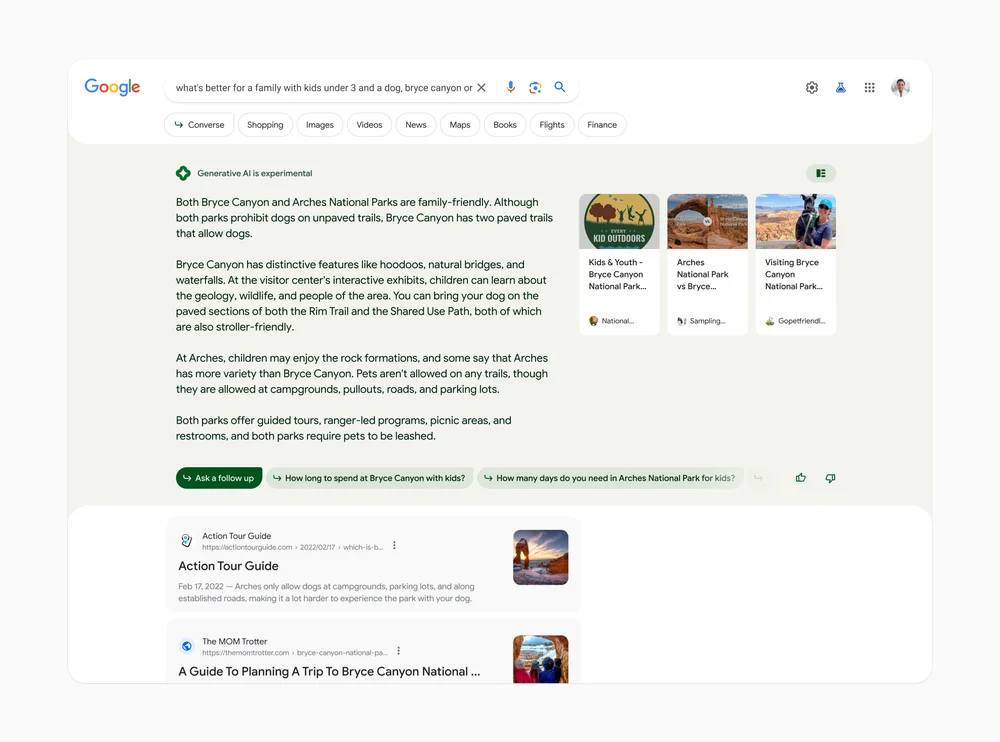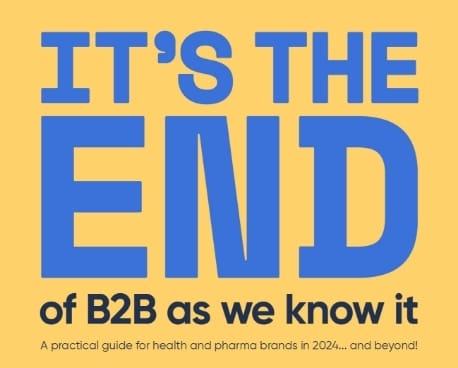Artificial intelligence and marketing are joining forces to reshape how healthcare brands connect with their audiences.
In this article, Medico’s founder, Ollie Capel, outlines five top predictions on the impact of AI on healthcare marketing in the coming years, providing an exciting glimpse into the future possibilities. We’ll also share our top tips to ensure your healthcare brand doesn’t get left behind!
1. Harnessing AI in healthcare marketing starts with quality data
A lot of AI use cases in healthcare marketing involve data. Artificial intelligence has the capacity to analyse huge amounts of data incredibly quickly, it can spot trends that are invisible to humans and make accurate predictions based on these findings.
However, its success depends on the quality of the data available: rubbish in, rubbish out.
Healthcare organisations often struggle with issues like fragmented data and poor conversion tracking. A true omnichannel approach to marketing is almost impossible unless your CRM, ad platforms and analytics are all talking to each other. These data silos lead to misinformed audience insights based on false assumptions and data bias. To unleash the full capabilities of AI, integrated data ecosystems are essential.
This means building data foundations before signing up to the hottest marketing tool available. Ensure your CRM data integrity, crack first-party data collection, and aim for an end to end, cross-channel attribution set up with your analytics stack.
When AI can start from comprehensive, consolidated data, the audience insights it provides become far more valuable, and the stage is set for the more impactful healthcare marketing strategies that we discuss further on…
Prediction: Expect a shift toward hiring data scientists and greater agency collaboration to strengthen data infrastructure
2. The search landscape will change drastically
AI is set to significantly change how users search for healthcare information online. Conversational AI and natural language processing will enable search engines to provide long-form answers directly on results pages, so for informational queries users are less likely to click through to individual healthcare websites.

As a result, your Google Ads strategy will likely focus more on targeting high-intent and bottom-of-the-funnel searches, something which Ad platforms are getting better at identifying through data and machine learning. Healthcare brands that have traditionally invested in educational content and early-stage awareness will need to adapt their strategies, and the way that search success is measured, accordingly.
To stay ahead of these changes, you should focus on producing informative, medically accurate content for AI companies to train their models on. The goal is for your content to surface as the most up-to-date, accurate information so your brand can be referenced as the source in search engines’ personalised answers, even if this means your own websites may see reduced traffic.
It’s likely that search engines will also prompt follow-up questions from search queries, turning the transactional, keyword-based approach to using Google that has been the status quo for the last 27 years (e.g. “knee surgeon London”), into a more natural conversation with our search engine (e.g. “who are the best knee surgeons in London that have availability next week within 30 minutes of home”). As this evolves we can expect specific, common, search terms to be used less frequently.
These changes will redefine our approach to creating content for search engines. Instead of needing pages to be targeted to specific keywords or answering a specific question, we will be able to write freely on a topic, focusing on providing the most comprehensive and valuable information possible.
Prediction: AI-driven search will change the strategy for capturing users at the top of the funnel, and liberate us from keyword-focused SEO content
3. Personalisation will prevail
As organic search sends less traffic to the top of the funnel, healthcare brands will shift focus. With lower volumes reaching owned sites, converting these high-quality visitors becomes imperative. Personalising content to the individual will be key to boosting relevance and conversion rates. This will accelerate the adoption of e-commerce and lead-generation capabilities. It will also drive more brands to leverage CMS experience engines like Sitecore. When growth depends on engagement quality over quantity, optimising user experience and conversion matters most.
Healthcare brands that understand their customer data will be able to leverage AI to create highly personalised ads at scale, with copy tailored in real-time based on the behaviour and journey of the user.

The capability of AI to generate personalised images and video content (for example, AI-generated talking head videos) can disrupt traditional video production, making content creation more relevant, streamlined and cost-effective. In addition, immersive technologies like AR and VR will likely become more commonly part of the healthcare marketer’s toolkit to enhance personalised experiences.
As high-volume awareness becomes harder to achieve, one-to-one personalisation will be key, tailoring experiences to individual needs and contexts.
Prediction: Expect healthcare companies to deliver hyper-tailored user experiences and direct-to-consumer (DTC) tactics
4. Enabling true omnichannel experiences
AI and predictive analytics will create a seismic shift in the ability to create truly integrated omnichannel experiences. Large language models, for example, can forecast emerging health issues in specific regions, enabling targeted outreach to healthcare professionals with timely resources to improve patient care.
Our Programmatic partner, The Digital Peloton, is already leveraging AI to refine targeting and messaging strategies for sales rep teams. This technology utilises CRM data and various customer interactions to sequence communications effectively, thereby boosting sales opportunities.
One of the key advantages of AI is its ability to adapt content swiftly to meet market-specific regulations and the needs of diverse audiences, such as patients and healthcare providers. This ensures that global healthcare brands can maintain a compliant, unified message while also offering localised, personalised experiences.
Data Management Platforms (DMPs) serve as comprehensive data repositories that amalgamate customer data from multiple sources, including online, offline, and mobile. AI enhances the scalability of analysing and segmenting this data, thereby reducing costs and making advanced technology more accessible. An integrated DMP is crucial for achieving truly coordinated marketing, as it enables brands to target customer profiles across various platforms with a consistent message.
Prediction: AI will enable healthcare and pharma brands to deliver more sophisticated omnichannel experiences across audiences and markets
5. AI will level the playing field
Historically, big pharmaceutical companies have had the upper hand in healthcare marketing due to their vast resources. However, AI is changing the game, allowing smaller healthcare organisations to compete effectively. Advanced AI models accessible via the cloud are helping to create new, impactful and cost-effective marketing strategies.
At a macro level, healthcare marketing winners will be those who can push the highest ROI, not just those with the deepest pockets, levelling the playing field and helping smaller businesses and startups compete with their larger, more resource-rich competitors.
Prediction: AI will enable smaller healthcare and pharma organisations to compete with their larger competitors via scalable, cost-effective marketing strategies
How to capitalise on the AI-powered future of healthcare marketing
To fully capitalise on the opportunities presented by AI, healthcare brands must focus on the following:
- Data integrity: Ensure your data is clean, complete, and accurate. This will provide a solid foundation for AI to build on.
- Customer understanding: Invest in getting to know your customers on a deeper level. This includes understanding their needs, pain points, and preferences.
- Agility: Be prepared to adapt your marketing strategies quickly as the AI landscape evolves.
- Partnership: Consider partnering with a digital healthcare marketing agency that understands the latest AI trends and technologies.
If you’re looking for a digital agency that understands the healthcare space and AI’s marketing capabilities, get in touch. Our team of digital experts can help prepare your brand and create a practical, implementable AI strategy for this new era of intelligent healthcare marketing.






